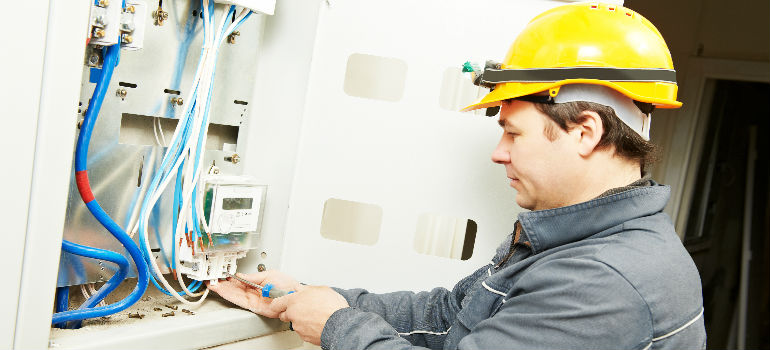
Electricity and the danger of getting electrocuted can be a very serious matter, which is why it’s very important to get educated about every possible safety measure in your home.
Table of Contents
A Few Facts About Electricity
In order to be able to protect yourself, your loved ones, your pets, and your property from a deadly electrocution, you need to know a few basic facts about electricity.
- Electrical currents always flow into the ground. It would do so through any material that is a conductor.
- Water and metal are great conductors of electricity.
- Wood and glass are poor conductors of electricity.
- The human body can be a conductor as well since a big part of it consists of water.
- If you’re not sure about something, do not risk it and ask a professional electrician for help.
How to Keep Your House Safe from Electrocution
With the right preparation, you can make your property safe for you and all members of your family. Here are the most important things to know.
- If you don’t know, don’t try. If there is a malfunction in the electrical wiring and you’re not sure how to fix it yourself, it’s better to call a professional electrician. Unlike with any other handyman task, this area gives very little room for error.
- Know your blueprints. Even if you’re not educated to do electrical work, it doesn’t hurt to know which fuse charges what. The easiest thing you can do is switch off the whole electrical current of your property in order to remove all danger.
- Cover all outlets. Covering sockets, free wiring, and any other outlet with plastic panels or isolating band might just save someone’s life. It’s also a recommended thing to do if you have pets or toddlers.
- Install GFCI breakers. A Ground Fault Circuit Interrupter is a device made to detect imbalances in the electrical flow. And, when it does, the power to that particular area will be immediately cut. Most new properties come with installed GFCI breakers, but if your home is an old building, you can request an installation.
- Do not leave bare wires loose. If your building property is brand new, you most probably have a few cables sticking out of the wall. These cables are intended to be used as power outlets. It’s highly advisable to do so as soon as possible since they can easily electrocute anyone who isn’t paying attention.
- Utilize three-prong plugs. The third prong grounds the electrical current and it should never be removed.
- Keep electrical appliances away from water. In the previous heading, we spoke how water is an excellent electricity conductor and this is why any electrical appliance and power outlet should be away from wet rooms and areas with a lot of moisture.
- Replace worn or damaged equipment. Pay attention to the condition of your electronic devices, as well as to the state of the power sockets and light switches. There are many signs that speak of unbalanced electrical wiring. For instance, it would most likely release sparks or heat up unexpectedly. Other signs include melting of the plastic switch or socket, short circuits, and damaged cords.
Need a Handyman?
Enter your postcode to view our rates and availability in your area.
For questions about the services we offer visit our main site or you can always call us at 020 3404 4045
How to Prevent Electrocution During a Lightning Storm
- Follow the weather report. The worst thing you can do in a lightning storm is being outside. Not just outside, but also in a wide open area with no trees and no buildings around to attract the lightning bolts. This is why it’s very important to check the weather forecast in order to plan your outdoor adventures during a safe part of the season.
- Find shelter. If you happen to be outside during a lightning storm, you have to quickly find shelter. The best example is a house or any building nearby. If that’s not possible, a car can also be useful, as long as you close the doors and windows. Small structures, like tents, stand-alone toilets, or picnic areas won’t keep you safe.
- Wait it out. If there isn’t any form of shelter around, the only thing you can do is stay put and wait for the storm to pass. While doing so, sit on the ground and hug your knees. Make yourself as compact as possible so you don’t take up much space. This can reduce the possibility of getting hit by a lightning. Make sure to keep any metal objects, however small, away from your body.
Check also:
How to Keep Your Home Safe from Earthquakes
How to React if Someone Gets Electrocuted
If by any chance, you witness someone getting electrocuted, the outcome can be either completely harmless or fatal, depending on the intensity of the shock. However, in this case, fatal is also a very relative term.
It is proven that the human body can survive a lightning hit, as long as the electricity does not pass through the heart. Which way it passes through is a completely random guess, so if worse comes to worst, here is what you can do.
- Look for a fire extinguisher. Electrocution can often lead to a fire hazard, which is why a fire extinguisher is mandatory. Do not attempt to put out the fire with water as it can lead to getting yourself electrocuted as well. Learn how to make home safe from fire.
- Do not touch the victim with bare hands. The victim could potentially still be conducting electricity, which is why you should use rubber gloves if you are required to touch or move them.
- Call for help. It is best to call the emergency services when someone gets electrocuted. You will most likely need an ambulance to take care of the victim and call the fire department to inspect the place of electrocution so no one else gets shocked.
- Turn off the power source. If you know where the power switches are, it might be a good idea to switch off the power in the entire room. If a problem in the electrical system does occur, it might not be isolated to a single spot. Better safe than sorry.
- Check for vitals. If a person has suffered a damaging electric shock that made them unconscious and stopped their heart, a bystander has about 4 minutes to begin CPR and help the victim breathe again. So, while waiting for an ambulance to arrive, this is the only thing you may do to help.
Electricity can be deadly if utilised improperly, so educating yourself and your loved ones are the first step towards guaranteeing a safe home environment.
Image Source: Dmitry Kalinovsky/shutterstock.com



